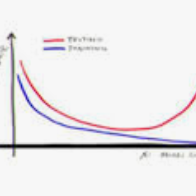Generalization properties are a central aspect of the design and analysis of learning algorithms. One notion that has been considered in many previous works as leading to good generalization is flat minima, which informally describes a loss surface that is insensitive to noise perturbations. However, the design of efficient algorithms (that are easy to analyze) to find them is relatively under-explored. In this paper, we propose a new algorithm to address this issue, which minimizes a stochastic optimization objective that averages noise perturbations injected into the weights of a function. This algorithm is shown to enjoy both theoretical and empirical advantages compared to existing algorithms involving worst-case perturbations. Theoretically, we show tight convergence rates of our algorithm to find first-order stationary points of the stochastic objective. Empirically, the algorithm induces a penalty on the trace of the Hessian, leading to iterates that are flatter than SGD and other alternatives, with tighter generalization gaps. Altogether, this work contributes a provable and practical algorithm to find flat minima by optimizing the noise stability properties of a function.
翻译:暂无翻译



